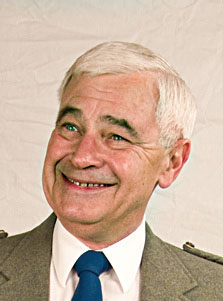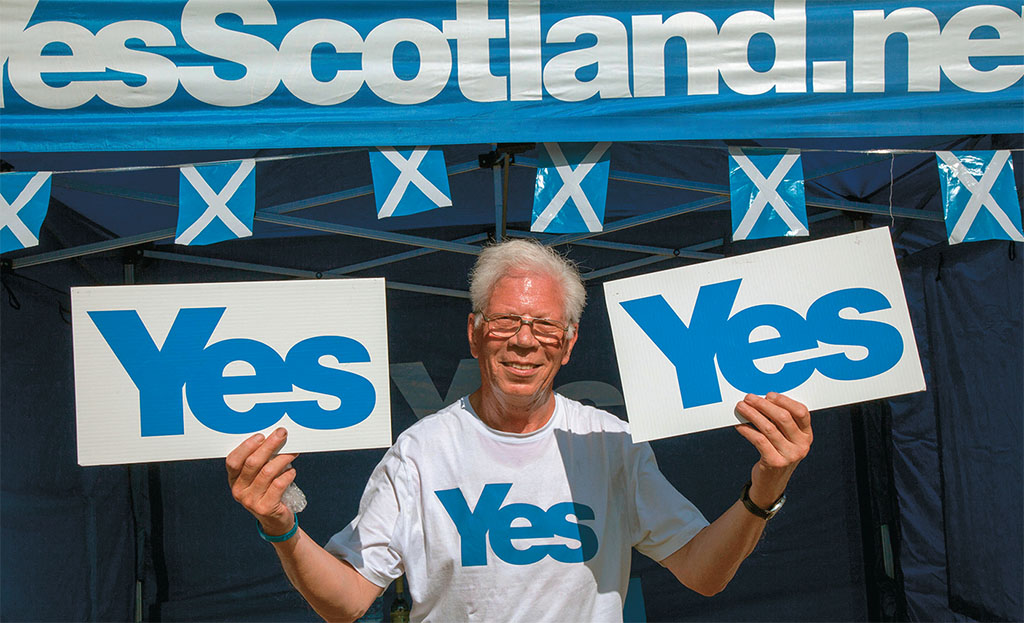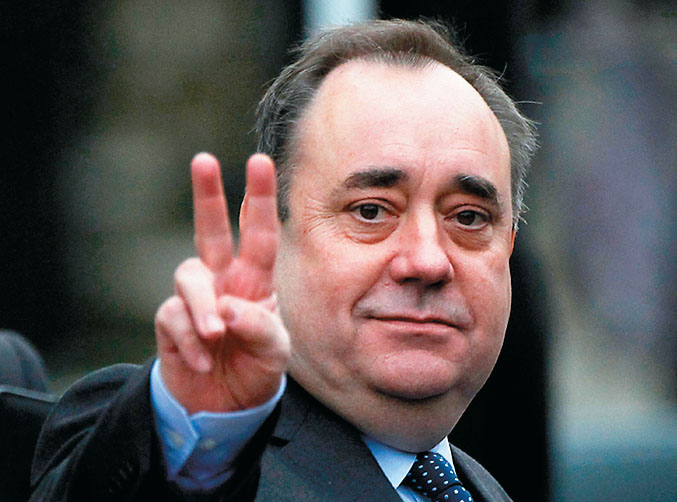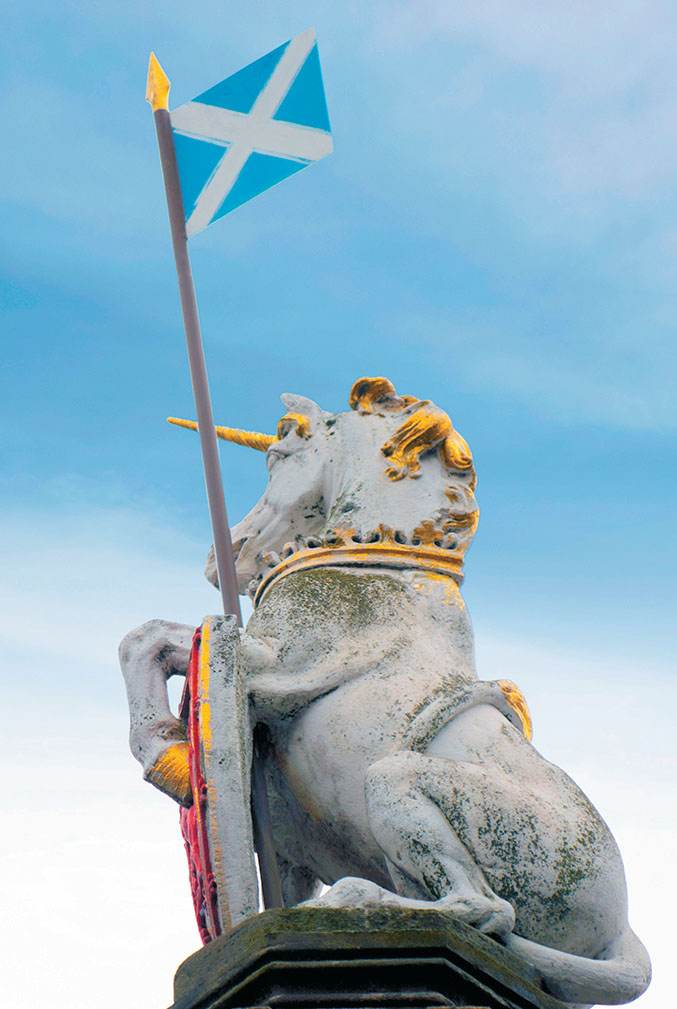
[caption id="WhitherScotlandtheBrave_img1" align="aligncenter" width="223"]

©ZOONAR GMBH/ALAMYY
[caption id="WhitherScotlandtheBrave_img2" align="aligncenter" width="1024"]

KIRK O’ROURKE/RANGERS FC/PA IMAGES
AT THE G20 SUMMIT in St. Petersburg this September, the Russian spokesman putatively remarked that “Britain is a tiny island and no one pays any attention to it anyway.” The insult was not lost on PM David Cameron who took umbrage at the comment and replied that Britain might be small, but had such accomplishments under its belt as abolishing the slave trade, defeating fascism in Europe and inventing most things worth inventing. The exchange was attributed to the tense atmosphere at the meetings over the Syria situation. Of course, Cameron might have continued that Britain has also produced the world’s greatest literature and beer, not to mention exporting to much of the world such things as literacy and a judicial system.
There’s national pride at stake here, boys and girls. And no, I don’t blame Cameron in the slightest for his riposte. Yes, certainly, there are ups and downs, moments of humiliation and shame, everywhere in world history. Still, there’s no question that Great Britain has an enviable record of accomplishment and influence in the parade of nations. So, why is it that folk want to upset a good thing?
Scarcely a day passes when the British media are not carrying some kind of coverage concerning next year’s independence referendum for Scotland: September 14, 2014. Former PM Gordon Brown, a proud Scot himself, has joined the Unionists advancing a strong argument that Scotland and its people will be better off remaining within the United Kingdom than going it alone as an independent nation.
[caption id="WhitherScotlandtheBrave_img3" align="aligncenter" width="1024"]

©DAVID MOHR/REUTERS
[caption id="WhitherScotlandtheBrave_img4" align="aligncenter" width="677"]

[caption id="WhitherScotlandtheBrave_img5" align="aligncenter" width="677"]

©MAR PHOTOGRAPHICS/ALAMY
The Nationalists, under the leadership of Scottish First Minister Alex Salmond have been equally vociferous in their calls from a complete break with the UK. While building the case to “go it alone,” the Nationalists of the Scottish Nationalist Party have invoked the emotions and Scottish pride in force with such causes centuries ago. After all, Scottish history was built upon 1,000 years of struggle, often for independence, against their more affluent and populous southern neighbors.
Next year is also the 700th anniversary of the Battle of Bannockburn, one of Scotland’s most famous defeats of the English in their centuries of intermittent warfare. In fact, British Heritage will tell the story—and that of the new battlefield visitor center near Stirling. It is sure to be an event to arouse that hot Celtic blood, and fuel sentimental support for the independence referendum.
Yea, even in the States and Canada, I’m sure many of those who retain a pride in their Scottish roots—belong to clan societies, attend Highland games across the continent, wear the kilt, country dance and so forth—whose heart at least is in sympathy with the Scottish independence movement. It’s Robbie Burns and Wallace, Robert the Bruce, Sir Walter Scott and a gross of mournful bagpipe airs and Celtic ballads rolled into one. Ah, yes, our heart’s in the Highlands. It’s not that I’m unsympathetic. I even wear the kilt (ancient red Gordon tartan) and miss my own Highlands back in New Hampshire.
It’s just not a good idea.
What’s the reality here? If Putin and his cronies think Britain is tiny, Scotland isn’t even going to show up on the map, with a population of 5,000,000 people (that is, about half of metropolitan London) and its largest city, Glasgow, having the highest number of households with no one employed in Great Britain. Revenues from North Sea oil are not going to begin to pay the tab of the “social democracy” that most Scots envision. Apart from the distraction of the SNP, Scotland votes predominantly Labour. Without the catalyst of the English Conservatives, it is only reasonable to conclude they will adopt economic and social policy consistent with the Mediterranean countries presently dragging the EU into financial collapse.
At the same time, it is difficult to imagine that the pro-independence folk have actually factored how much it will cost the wee country to maintain the customary fixtures of statehood such as a foreign service and a diplomatic corps. Of course, if they find it too taxing to maintain fully functioning embassies around the globe, they can probably sublet a walk-in closet from the Ugandan embassy. And that is just the beginning. It will likely cost Scotland almost as much to collect its taxes as there are taxes to collect.
Set the romantic sentiment aside. Scotland, England and Wales have separate and very distinct histories. And often in those histories they were bloody enemies. Going back that far, whose histories weren’t bloody from one cause or another? The crowns and monarchies were brought together, though, in 1603 on the death of Queen Elizabeth I. And the parliaments of England and Scotland were formally joined a century later in 1707 in the Act of Union. That’s two full generations before the United States was even a country.
In that Union of Great Britain, Scotland has punched above its weight. The pantheon of Scottish accomplishment is remarkable for the nation’s size, in literature, medicine and engineering—not to mention Andy Murray. In fact, the Union has allowed what became the United Kingdom of Great Britain to play very much above its weight in world affairs, intellectual and cultural achievement and moral influence over the last 300 years: a sum greater than its parts.
There is no perceived material benefit to the Scottish people in this emotional decision. Indeed, the efforts and energy of Scotland’s political and social leaders would be far better spent than preoccupied by this protracted, romantic debate. In this uncertain and dangerous world, British interests ought to stand as strongly together as possible. To be flirting with the Balkanization of a nation that has stood as illustriously as Great Britain has for so long seems at the very least like playing Russian roulette with history.





Comments